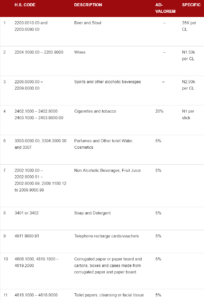
The federal government will re-introduce excise duty on some goods manufactured in the country and excisable imported goods in line with the directive of ECOWAS council of ministers.
In a letter addressed to President Muhammadu Buhari and seen by TheCable, Kemi Adeosun, minister of finance, said spaghetti and noodles would be exempted from the changes.
Adeosun said noodles and spaghetti were exempted on the fact that “they currently constitute significant staple and accessible foods, which are easily affordable by all economic class of the Nigerian society”.
The minister had suggested that all excisable products removed from the excise list in 2009 be returned. The excise duty is five percent.
Excise duty is a type of tax paid on goods manufactured in a country. It differs from custom duties, which is paid on imported goods.
According to a list on the Nigeria Customs Service website, excisable goods include perfumes, cosmetics, non-alcoholic beverages, fruit juice, soap and detergent, telephone recharge cards, corrugated paper or paper board and toilet paper.
She said the recommendation was made by the tariff technical committee (TTC), which is chaired by the ministry of finance with members from ministries of industry, agriculture, Central Bank of Nigeria, Federal Inland Revenue Service, Office of the Secretary to the Government and Manufacturers Association of Nigeria.
“However, Your Excellency may wish to note that the recommendation to draft all excisable products ousted in 2009 back into the excise net in 2018 by the TTC is subject to the amendment of Part III, Section 21 of the Customs Excise Tariff, etc. (Consolidation) Act Cap. 49, LFN 2004 on ‘Goods liable to excise duty’ to include imported goods,” she wrote.
“This is to allow for fair competition between locally produced and imported products, as only locally manufactured goods are currently liable to excise duty.”
On October 25, 2013, the Economic Community of West African States signed agreed to begin implementation of the ECOWAS common external tariff (CET), one of the instruments of harmonising member states to strengthen its common market and took effect in Nigeria on April 11, 2015.
Adeosun also said additional levy will be placed on items where Nigeria has comparative advantage while duty will be reduced on machineries, equipments, spare parts and basis raw materials.
“The Import Prohibition List (Trade) is retained to protect Nigerian industries and manufacturers from unfair competition and dumping,” she wrote.
“However, the list has been reveiwed downwards with three items removed in line with Nigeria’s commitment to ECOWAS for the gradual phase-out of import prohibition.
“Nonetheless, two additional items were added to the list as a result of the federal executive council approval for ban on importation of tomato and tomato paste in retail packs, as part of measures to boost production and attract investments into the Nigerian tomato sub sector.”
The letter also recommended the imposition of a two-way tariff on tobacco and alcohol.
THE PROPOSED TARIFFS



Be the first to comment